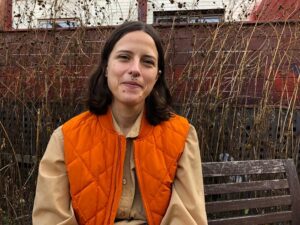Lindsay Miles, one of this winter’s Fine Arts Work Center fellows, doesn’t feel comfortable calling herself a writer. “I think I’ll be 80 and I’ll still be unsure of the titles that I should use for myself,” she says. A refusal to be pigeonholed and an awareness of the way that labels can consign and circumscribe is evident in Miles’s current book-length essay project, which refuses to sit neatly in a singular literary genre.

Though Miles began as a poet and is the author of two poetry chapbooks, Edeltraut (Anstruther Press, 2022) and A Period of Non-Enforcement (The Operating System, 2019), she wanted to use the FAWC fellowship to challenge herself to write prose.
“I wanted a little bit of a buffer around the language because I feel like a poem is just so condensed and distilled,” she says. “I was craving a bit more expansiveness. Prose has the ability to give you that.”
Miles describes her essays as written in the style of a “poet’s prose.” It’s heavily image-driven, lyrical, and generally non-narrative, progressing from images to personal stories to history to philosophical ruminations. Miles says she gleans inspiration from the writers Anne Boyer, Wayne Koestenbaum, and Renee Gladman — all of whom work at the edge of numerous genres including poetry, critical theory, and creative nonfiction.
Miles’s project revolves around the theme of self-pity. She says numerous threads spring from that: gender, alcohol, grief, bugs, spirals (both metaphorical and literal), and more. Miles says there wasn’t a particular moment she decided to tackle the subject of self-pity. Instead, she has long been fascinated by its complexity.
“It’s both a feeling and a judgment of a feeling,” she says. She adds that self-pity is loaded with religious and gender-based implications.
For Miles, who is based in Toronto, the quiet of a Provincetown winter has allowed her to focus more deeply on this ambitious project. “I’m coming from a city of three million,” she says. “But in Provincetown, there’s no honking, there’s no person screaming outside your window.” The environment has also worked its way into her writing. She says that she’s used the geology of the land and beaches here as inspirations. The recurring theme of spirals in her essays — both physical ones in the environment and emotional ones within us — comes from living on land that literally spirals. “Place is always a part of the writing,” she says. “Provincetown is there in the work.”
Miles says she’s been following a daily routine during the seven-month fellowship. She’s a morning writer. She wakes before eight and immediately heads to her books and the blank page, alternating between reading and writing till noon. The afternoon consists of more reading; anything that gets done in the evening is a bonus. To Miles, reading isn’t a distraction from writing but a central element of the process. It replenishes her language and keeps her inspired. “I very much agree with a lot of writers who say reading is writing,” she says.
Miles says she is grateful for the opportunity to write and read uninterrupted, without the time-bound obligations of a job or commitments back home. In addition, the other fellows, the FAWC staff, and the local community have all made her feel less lonely than she initially worried she would be, moving from a big city to quiet, wintry Cape Cod. The main challenge of living in Provincetown? “I really miss fast food,” she says. “I miss it so much. I dream about McDonald’s cheeseburgers.”
Her venture into prose is both daunting and exciting. “Like any creative project that’s at its beginning, it’s a bit unwieldy at this moment,” she says. Yet she is excited to share what she has been working on thus far. There will be an opportunity for that when Miles reads from her work as part of the first fellow showcase of the season this Friday, Feb. 9 at FAWC from 5 to 8 p.m. Fiction fellow Avigayl Sharp will also give a reading of her work, and visual arts fellow Jeff Gibbons (profiled in the Feb. 1 edition of the Independent) will show and discuss his multimedia works.
Miles is looking forward to continuing work on her essays and says she’s not going take any of the time for granted. “Being here has been a kind of dream,” she says. “It’s so rare to get this length of time to just pour into your creative projects.”
